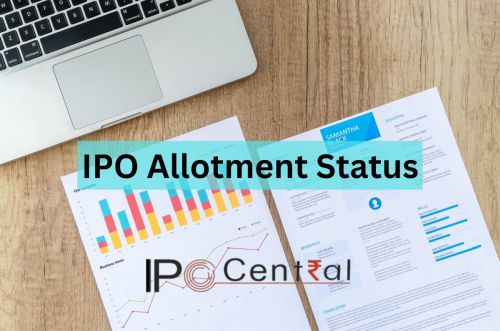IPO allotment status is a crucial step in the entire IPO process, providing investors with information about the shares allotted to them. The registrar of the public offer handles share allotment in an IPO. For main board offers, KFin Technologies and Link Intime are the leading registrars, while Bigshare is the prominent player for SME IPO allotment status. In this article, we will delve into the IPO allotment process and provide insights into checking the IPO allotment status.

Recent IPO Allotment Status
Here are the recent IPOs and their respective allotment statuses:
Understanding the IPO Allotment Process
After subscribing to an IPO, investors typically wait for nearly a week. During this time, all applications undergo sorting, vetting, and removal of incomplete applications. The subsequent allotment process is a draw conducted by the registrar of the offer. The registrar is responsible for allotment, transfer of shares to investors’ demat accounts, and processing refunds for unsuccessful applications.

How to Check IPO Allotment Status?
Registrar Websites: The registrar’s website is the primary source for checking IPO allotment status. Investors can visit the respective registrar’s website and enter their PAN (Permanent Account Number) or the IPO application number to check the number of shares allotted.
Stock Exchange Websites: BSE (Bombay Stock Exchange) provides a facility to check allotment status on its website. However, NSE (National Stock Exchange) currently does not offer this service.
Bank Account: In some cases, when registrar and exchange websites are slow or inaccessible, investors can check their bank balances to get an idea about the allotment status.
Credit in Demat Account: Once shares are allotted, they are credited to investors’ demat accounts. Investors can check their demat accounts to verify if the shares have been credited.
How to Check IPO Allotment Status at Registrar Websites?
Registrar websites are often the best way to check IPO allotment status. Here are the links to the IPO allotment status pages of various registrars:
Link Intime IPO Allotment Status
How to Check SME IPO Allotment Status?
SME IPOs have different dynamics compared to mainboard IPOs. The number of SME IPOs is usually higher, but the participation of small retail investors is relatively restricted due to higher capital requirements. Here are the links to the IPO allotment status pages of popular registrars for SME IPOs:
How to Check IPO Allotment Status on Stock Exchange Websites?
Among the major stock exchanges in India, only BSE allows investors to check allotment status while NSE has no such facility as of now. When compared with the experience of registrar websites, BSE IPO status is a breeze. Here is the link for the BSE IPO status
Why Does the IPO Allotment Process Take Time?
The IPO allotment process involves several steps and adheres to the regulations set by the Securities and Exchange Board of India (SEBI), the market regulator. SEBI has defined a stepwise timeframe for IPOs, starting from the subscription date until the eventual listing. While the advent of electronic handling of applications has made the allotment process more efficient, investors still have to wait for a specific duration due to regulatory requirements.
In August 2023, SEBI changed the IPO listing timeframe to T+3 which means that IPOs will have to mandatorily list after 3 days of the issue closing date. The new rules came into effect from December 2023.
SEBI further aims to transition to a T+1 settlement cycle in India. If this change takes effect, it will further expedite the IPO allotment timeframe, benefitting investors.
Debunking the Myth of Manipulated IPO Allotment
A common concern among investors who do not receive share allotments in public offers is whether the IPO allotment process is manipulated. It is important to understand that the IPO allotment process is computerized and entirely random. The high demand for IPOs often leads to oversubscription, resulting in many investors not receiving allotments. This can create a perception that only a select few investors are favored.
Read Also: Best Paper Trading Websites in India
While it is true that registrar websites may experience crashes or delays when publishing the IPO allotment status, there is no substantial evidence to suggest that the process is unfair. SEBI has clearly outlined the steps and responsibilities of all intermediaries involved in the IPO allotment process, including registrars. Therefore, investors can trust that the process is conducted with integrity.
Optimizing IPO Allotment Chances
Avoid Oversubscription: When an IPO is oversubscribed, making large applications does not necessarily increase the chances of receiving a higher allotment. In such cases, it is only when the retail category receives fewer applications than earmarked that investors have a better chance of obtaining a larger allotment. It is crucial to analyze the demand and subscription details before making investment decisions.
Research the IPO: Before applying for an IPO, it is advisable to thoroughly research the company, its financials, and its growth prospects. Understanding the fundamentals and evaluating the IPO’s potential can help investors make informed decisions.
Consult with Financial Experts: Seeking advice from financial experts or professionals in the field can provide valuable insights into the IPO market. They can help analyze the IPO’s prospects, assess risks, and guide investors in making appropriate investment choices.
By adopting these strategies, investors can enhance their receiving favorable IPO allotment chances.

Understanding the IPO allotment process could be very helpful and insightful for investors in appreciating the intricacies and the role of luck in getting shares.
Here are some more resources for you:
- Best IPOs that doubled investors’ money in 5 years
- IPO Subscription Status
- Best Monopoly Stocks in India
- Best Virtual Trading Websites in India
- White Label ATM – Meaning, Example, Regulations, Operators
- Brown Label ATM – Meaning, Example, Operators
- Best Indicators for Options Trading
- 7 common IPO mistakes and how to avoid them
- All-time largest IPOs in India at a glance
- Treds Portal: Meaning, Full Form and all 8 important points you need to know
- IPO FAQs (Frequently Asked Questions)





































